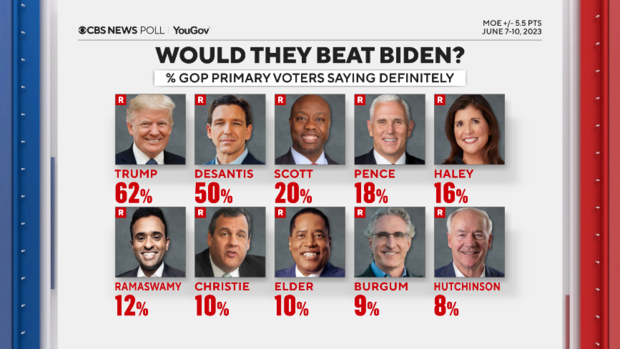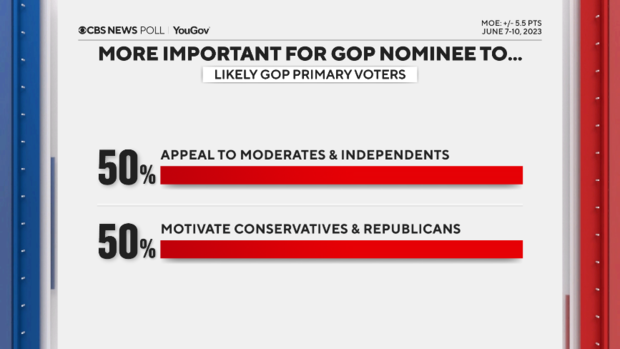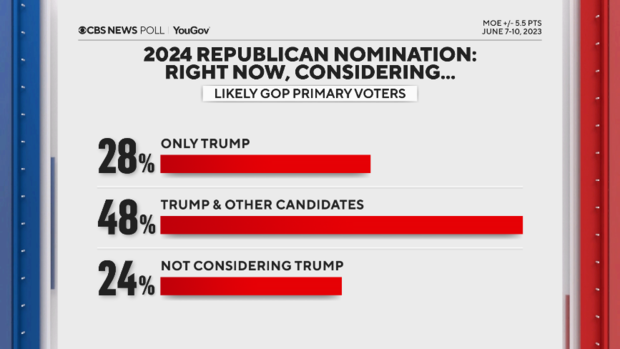Former President Donald Trump is Republicans’ top choice for a presidential nominee, not only because they like what he did as president, but also because they think he can win. Despite questions about his electability, they still see him as their best shot to defeat President Joe Biden. And views of electability depend on what voters prefer in a nominee: appealing to Americans in the middle or turning out the base.
Despite Trump’s multiple indictments, six in 10 Republican primary voters say he would “definitely” beat Mr. Biden in a 2024 general-election rematch. And comparing data collected before and after federal charges were unsealed, the new indictment has not put a dent into this number — at least not yet.
Florida Gov. Ron DeSantis has talked about electability on the campaign trail, highlighting his landslide win last year in Florida, but he trails Trump on this measure. Half of GOP voters say he would beat Mr. Biden, putting him much closer to Trump on this measure than he is in actual support. Another 36% say DeSantis “might” win.
So, the top two candidates in the horse race are also the top two on electability, and the rest of the field is far behind them. The other eight candidates tested, many of whom are still unfamiliar to the primary electorate, elicit at most 20% who say they would definitely win, with several being described by majorities as a “long shot” instead.
What Republicans want in nominee
The GOP primary electorate is currently split 50-50 over whether it’s more important for their nominee to motivate the base to vote, versus appeal to moderates and independents. Among those prioritizing the former — base turnout — Trump’s electability advantage is even bigger. Two-thirds of them say he would definitely beat Mr. Biden, putting Trump 25 points clear of his closest challenger.
It’s a different story among GOP voters who prioritize appealing to those in the middle. DeSantis and Trump are effectively tied on electability among them (DeSantis at 57% and Trump at 56%). DeSantis is also doing better with them on current support — as are Tim Scott and Nikki Haley.
DeSantis is also much closer to Trump on electability among the large majorities of GOP voters who would prefer Trump not talk about the investigations he’s facing now and what happened in 2020. And he’s a bit closer on support with these groups too, though Trump is still leading them.
Electability, consideration, and needing to hear more
Most candidates’ perceived electability hews fairly closely to their current consideration among the electorate. The more voters say they would beat Mr. Biden, the more are considering them. As the chart below shows, these two numbers are just a couple of points apart for most candidates.
For example, DeSantis’ 50% electability score nearly matches the 52% considering him today. The one exception is Trump, whose electability number is very close to the number saying they would vote for him — both six in ten — and is therefore lower than his consideration number.
Tim Scott, in a distant third on both electability and consideration, elicits far less confidence than either Trump or DeSantis. It’s partly because many GOP voters want to learn more about him — four in 10 say they “might consider, but haven’t heard enough” about Scott, and among those who at least might consider him, most say he might beat Mr. Biden.
The rest of the field is suffering from a similar mix of unfamiliarity and uncertainty. For example, Vivek Ramaswamy gets about a third of voters saying they might consider him but haven’t heard enough and a third saying he might beat Biden.
These candidates are viewed as long shots in part because voters haven’t learned much about them yet. With more than six months until the first nominating contests in Iowa and New Hampshire, many Americans aren’t paying close attention to the campaign.
This relationship between consideration and perceived electability was also apparent in CBS News polling of Democratic primary voters four years ago. Candidates under consideration by more voters tended to have better electability numbers then too, but Democrats were much less confident in their chances of beating Trump in 2020. For example, 75% of Biden considerers said he would “probably” win. Today, 77% of Trump’s considerers say he would “definitely” win — a higher bar. (The field was also much larger in 2020, with voters considering more candidates.)
Voters still shopping around
Turning back to the top two candidates, we’ve seen some overlap in consideration of Trump and DeSantis, and the race is closer among voters considering multiple candidates, which is most of them at this early stage. Among this group, DeSantis is even with Trump on both consideration (eight in 10) and electability (six in 10 say definitely beat Mr. Biden).
Another way to look at the race is segmenting out voters who are only considering Trump and comparing them to voters considering him and at least one other candidate.
- Nine in 10 of the only-Trump group say he definitely wins — 43 points ahead of DeSantis.
- Among voters considering Trump and others, the electability gap is much smaller: Trump is at seven in 10, DeSantis six in 10.
Finally, among voters not considering Trump at all — the smallest group — DeSantis leads on electability. However, only 42% say he definitely wins, with everyone else under 20%.
These voters are basically just more pessimistic across the board, with no candidate getting a majority confident in their chances. That includes Trump. Those not considering him are much less certain than other GOP voters that he can beat Mr. Biden — six in 10 say he “might” win.
This CBS News/YouGov survey was conducted with a nationally representative sample of 2,480 U.S. adult residents interviewed between June 7-10, 2023. The sample was weighted according to gender, age, race, and education based on the U.S. Census American Community Survey and Current Population Survey, as well as past vote. The margin of error is ±2.7 points for the sample overall and ±5.5 points for likely Republican primary voters.



